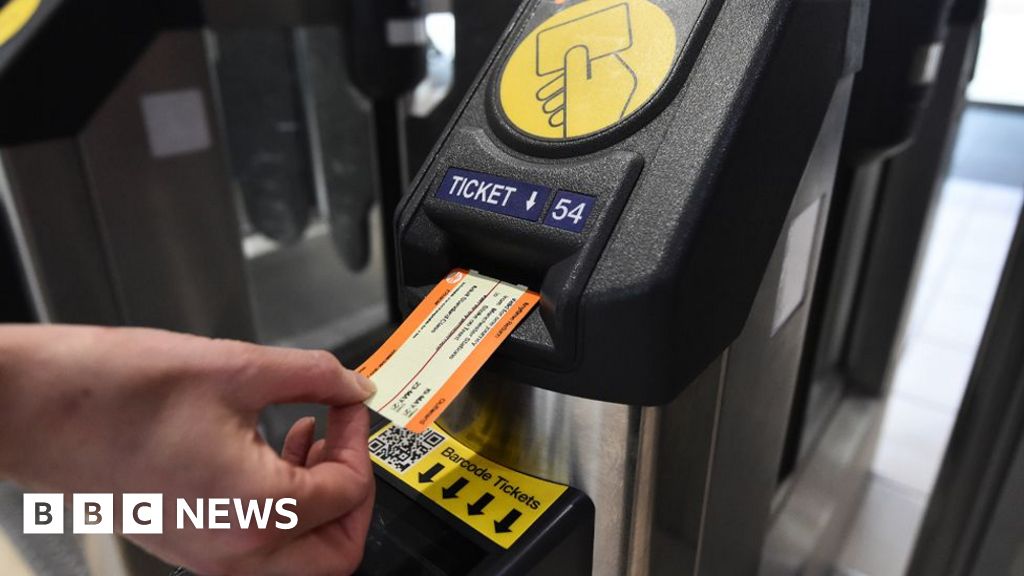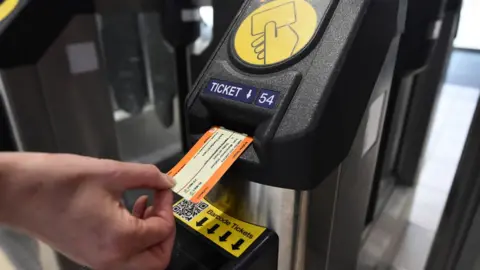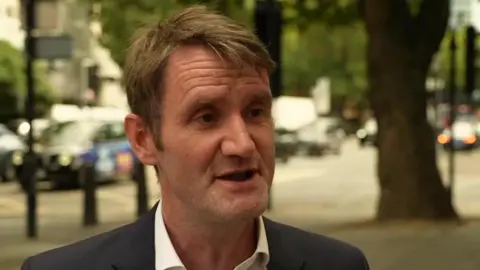
Thousands of train fare prosecutions set to be quashed
- Business
- August 15, 2024
- No Comment
- 121
 Getty Images
Getty ImagesAs many as 74,000 prosecutions for alleged rail fare evasion in England and Wales are set to be quashed following a landmark ruling.
UK rail companies had been fast-tracking alleged ticket dodging offences using a process called the single justice procedure (SJP), which allows magistrates’ hearings to be held behind closed doors.
But on Thursday, the UK’s chief magistrate, Judge Goldspring, declared six test cases as void, saying the process should never have been used.
The exact number of similar cases that will need to be quashed is still unclear.
Authorities including the Department for Transport (DfT) as well as train companies will now have to agree a list of all people whose prosecutions could be overturned by the end of September.
These people would be “directly contacted…to resolve the cases,” a DfT spokesperson said.
Refunds could take months
The process of refunding fines is likely to take months.
Firstly, individuals will have to be identified by courts and train companies. They will then have to be contacted before they can be reimbursed.
Judge Goldspring said a team would “begin the work of recovering the money paid and refund the money to individuals” by November.
“There are discussions ongoing with all the parties about how that may be paid,” he added.
The DfT said affected cases were prosecuted by Northern, Transpennine, Avanti West Coast, Greater Anglia, Great Western Railway, Arriva Rail Northern and Merseyrail.
It said the list could be amended and may be updated on Monday, 19 August.
In a hearing last month both Northern Trains, the government-owned operator, and Greater Anglia had apologised for using SJPs.
Northern stated it “welcomed” the ruling, adding: “We would like to apologise again for the errors that have occurred.”
It also said: “Northern remains committed to ensuring that all our customers are treated fairly, which means ensuring all passengers who board our trains have a valid ticket.”
The DfT said: “While fare evasion should be tackled, the right process should be followed at all times.”
‘Complete vindication’

Christian Waters empathises with those people prosecuted for alleged rail ticket dodging. He had his own legal battle with Northern Trains – over a £3.50 fare.
Back in 2022, Mr Waters tried to buy a ticket to Leeds but found the machine at Kirkstall Forge station in Yorkshire was not working. There was no guard on the train so he went to the excess fare window at his destination.
He was pulled aside by revenue inspectors, who handed him a penalty fare notice. He refused to pay and appealed but that was rejected.
Mr Waters then received a series of letters with escalating demands adding costs. Eventually, he received notice of a single justice procedure and he pleaded not guilty.
He complained to Northern about the process the train company had used. The prosecution ended up being withdrawn and they settled the matter for £3.50.
Reacting to Thursday’s ruling, he told the BBC: “It feels like a complete vindication of my position right from the start. It was a lonely furrow I was ploughing for some six months…to see it elevated to the chief magistrate it’s a matter of great satisfaction for me.”
He said there were “further questions” about how the situation had reached the point that tens of thousands of people had been prosecuted.
Asked about those people who may have intentionally not bought a ticket whose prosecutions will be overturned by this ruling, Mr Waters said: “We simply don’t know – they never got a fair trial.”
‘Reform needed’
The single justice procedure is used in magistrates’ courts and handles around 40,000 minor offences every month – such as not paying for a TV licence or car insurance.
It was used to prosecute a number of people for allegedly breaking lockdown rules during Covid.
For alleged rail fare evasions, the vast majority of affected cases were prosecuted from 2020, according to the DfT.
The single justice procedure, which does not involve a public hearing, was introduced under the Criminal Justice and Courts Act 2015.
Train companies were allowed to use it for alleged fare evasion the following year.
However, some rail operators brought private prosecutions against individuals under the Regulation of Railways Act from 1898.
They were not allowed to use the older act for single justice procedures.
In a summary of his judgment, Judge Goldspring said “parliament did not envisage” train fare offences being prosecuted using SJPs.
“They should never have been brought through that process,” he said.
Earlier this year, the Magistrates’ Association, which represents more than 12,000 magistrates in England and Wales, said some of its members were “uncomfortable with the process as it currently works” and that it needed reform.
The Magistrates’ Association’s national chair Mark Beattie said that while the group believed the principle of the procedure is “good”, the system is not “perfect”.
He said some magistrates “have told us about flaws in the way it operates and the harm that this can have on some of society’s most vulnerable people”.
#Thousands #train #fare #prosecutions #set #quashed










